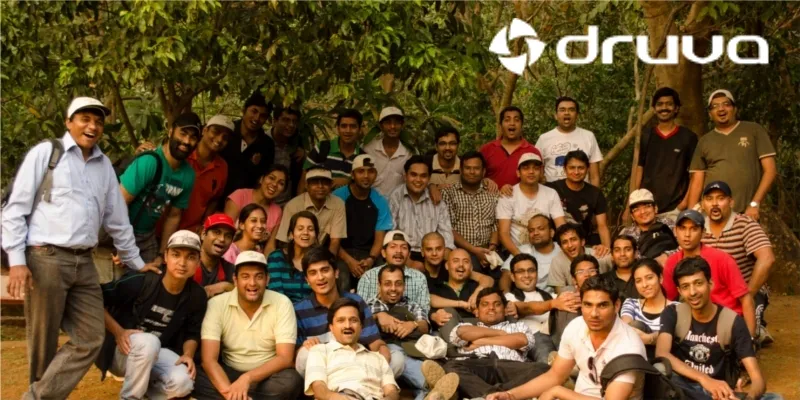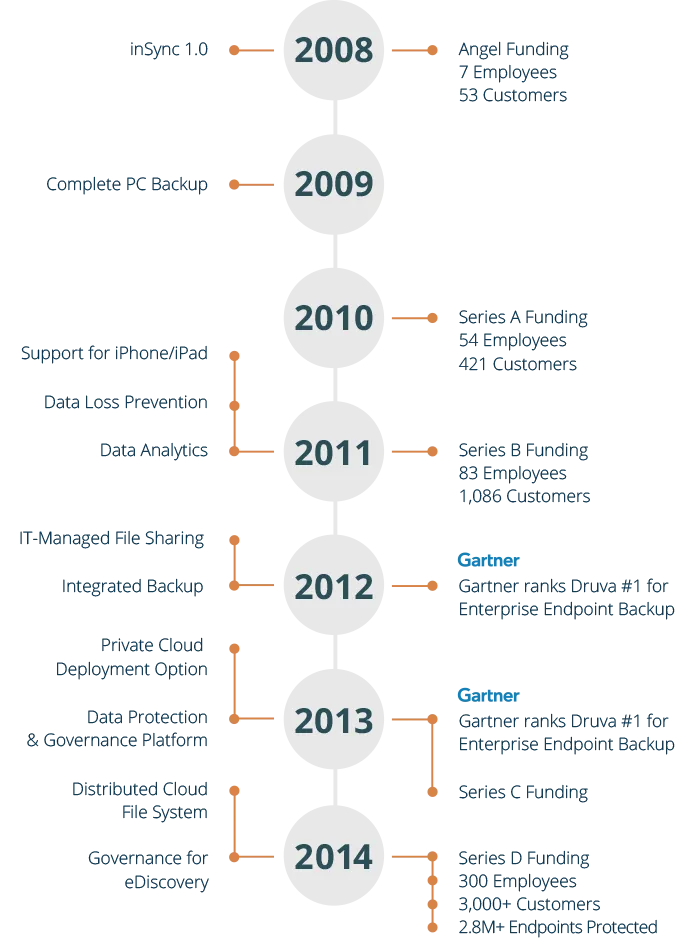The Druva Growth Story: 3,000+ customers, $65 million+ in funding and big data pastures ahead
Druva is one of the prime examples of building a global technology company from India. It was back in 2008 that Milind Borate, Jaspreet Singh and Ramani Kothandaraman set out to create a new kind of data protection solution for the enterprise. Prior to co-founding Druva, Milind worked at Veritas Software as Technical Director for SAN-FS and served on the board of the Veritas patent filter committee. Milind was the one who encouraged Jaspreet to join Veritas and he became of the youngest folks to join the company. Ramani was also with Veritas. Soon, they both got the itch to take up something more challenging and start up. The trio had been with corporates and knew the gaps that existed in the corporate data and security area. This is what gave them the push to start up Druva. (read our detailed interview from back in 2010)

The Early Days
“Druva began with corporate data protection for laptops,” says Milind. There was a lot of data that was lost at small companies and there was no way to prevent this from happening. Druva came up with a very simple product that worked well to help companies save their data. They began pitching to companies and found early takers in India but they noticed a big inbound demand from the US. Companies over there wanted such a product and the market was already there. “We realized pretty early on that our market lies globally,” says Milind.
When they had gone out with the first version of their product, the feedback was that the product was too complex. Jaspreet was the person in charge for sales and he came back hearing the same complaints when he went out to talk to the customers. They took in the feedback and made the product really simple with a clear value proposition. This is when the product found acceptance and found clients all over. By the middle of 2010 itself, Druva had 400+ customers across 26 countries (source).
The Funding Jouney
Druva raised its latest round of funding this month- a series D round of $25 million from Sequoia Capital, Tenaya Capital and Nexus Venture Partners. This brings the total funding to $67 million.
Druva had raised its angel round from the Indian Angel Network back in 2008 and then a round of $5 million from Sequoia and IAN in 2010 when it shifted its base to the US. The team at Druva had realized that their major market was in the US and a presence over there would make a lot of sense. Druva then raised a Series B round of funding for $12M in the later half of 2011 led by Nexus Venture Partners with participation from Sequoia Capital. At that time, Jaspreet wrote on their blog:
I can still remember working from a “shared” garage office when Druva was a bootstrapped company with just 7 people. After wasting about 6 months, the “eureka” moment came in July 2008 with the launch of inSync (n integrated suite of endpoint data protection and governance solutions), and since then we haven't had the time to look back.
The growth kept coming and the focus on marketing and sales had seeped into the company. Druva’s customer base has expanded from 1,500 to 2,100 in the last year with a corresponding jump from 1 million to 1.7 million in the number of endpoints under protection. The company has also expanded its workforce from 124 at the end of 2012 to an expected 200 by the end of 2013. Investor confidence was high and in 2013, Druva raised a $25 million series C from Sequoia Capital and Nexus Venture Partners as well as a substantial first-time investment from Tenaya Capital. And within 10 months of the series C, Druva went on to raise another $25 million series D round. Funding is surely not a parameter of measuring success but it definitely validates the companies potential and possibilities.
Along the way

Selling to enterprises, Druva has been in the thick of things as the corporate world saw the shift from laptops to mobile devices. "We saw a huge shift towards mobile devices and we accordingly expanded our product suite to take care of all the new requirements. The other trend was the rise of cloud and its increasing adoption. More and more companies were comfortable with keeping data on the cloud and that revenue stream grew aggressively for us," says Milind. Druva also maintains a flourishing blog with some valuable posts on it. In one of the article, the cloud is summarized pretty well,
The cloud is less about technologies and architectures than it is an operating model which represents the way you do business.
Druva’s first version of inSync was an exclusively on-premise product, they solved the problems of that day’s enterprise. As their customers became more global, always-on, and scalable, they had to evolve, too. Druva has a team of over 250 employees (have a look at their culture) and more than 3000 customers with 2.8 million+ devices protected. The Series-D funding is only 9 months after Druva raised series-C of $25M which is a lot of money in a short period of time. To this, Jaspreet says talking about the future, "In the past year, the Druva growth story has been stronger than we had expected. We have had some great customer wins, like Pfizer, Dell, Shire, and many others. Fast-evolving business unit economics makes it easier to predict future growth. We were surprised by a strong term sheet by Sequoia; so we thought it would be easier to close the round now in order to focus on business."
Druva is also the latest of the lot to join the INR 1000 crore valuation in India and the road ahead is going to be very exciting.
Website: Druva







